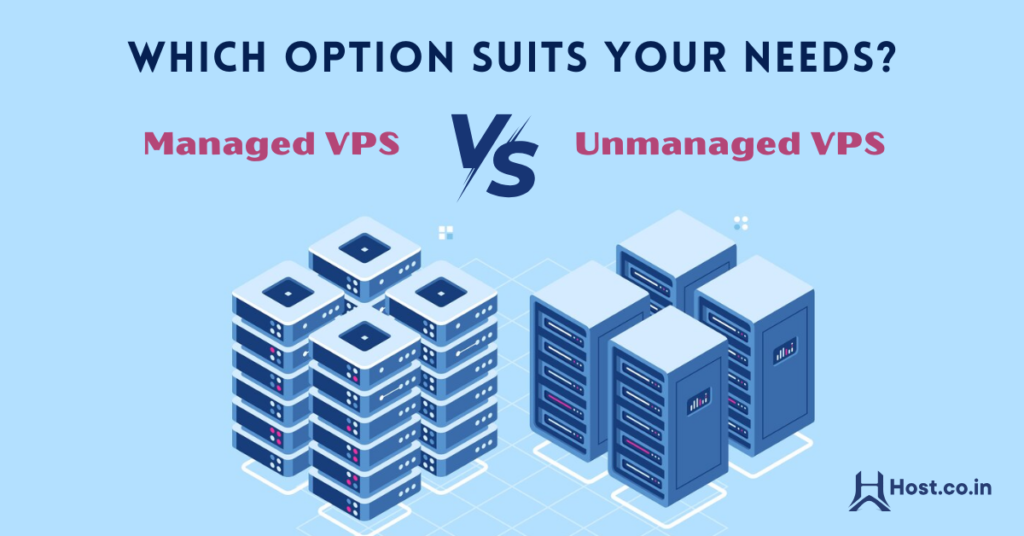When it comes to web hosting, Virtual Private Servers (VPS) are a popular choice for businesses and developers who need more control and resources than shared hosting can offer but don’t want to manage a dedicated server. Two primary types of VPS hosting are available: managed and unmanaged. Choosing between them depends on your technical expertise, time commitment, and specific needs. Let’s explore the differences and help you decide which option suits your needs best.
Understanding VPS Hosting
Before diving into the comparison, it’s essential to understand what VPS hosting entails. VPS hosting uses virtualization technology to divide a physical server into multiple virtual servers, each with its own dedicated resources. This setup provides better performance, security, and control compared to shared hosting.
Managed VPS Hosting
Managed VPS hosting is ideal for those who prefer a hands-off approach. With managed VPS, your hosting provider handles the server management tasks, including:
- Server Setup and Configuration: The initial setup, installation of the operating system, and configuration of software and applications are managed by the hosting provider.
- Maintenance and Updates: Regular updates, security patches, and system maintenance are taken care of, ensuring your server remains secure and up-to-date.
- Security Management: The provider implements robust security measures, such as firewalls, malware scans, and intrusion detection, to protect your data.
- Performance Monitoring: Continuous monitoring of server performance and resource usage helps in optimizing and ensuring the server runs efficiently.
- Technical Support: Round-the-clock support is available to address any issues or queries, providing peace of mind and saving you time.
Managed VPS hosting is typically more expensive than unmanaged VPS due to the additional services provided. It is an excellent choice for businesses without an in-house IT team or those who prefer to focus on their core operations rather than server management.
Unmanaged VPS Hosting
Unmanaged VPS hosting, also known as self-managed VPS hosting plans, offers greater control and flexibility but requires a higher level of technical expertise. With unmanaged VPS, you are responsible for:
- Server Setup and Configuration: You need to install the operating system, software, and applications yourself.
- Maintenance and Updates: Regular updates and system maintenance are your responsibility, requiring you to stay on top of security patches and software updates.
- Security Management: Implementing security measures, such as configuring firewalls and performing regular scans, is up to you.
- Performance Monitoring: Monitoring the server’s performance and resource usage to optimize its operation is necessary.
- Technical Support: While the hosting provider may offer basic support, you are generally on your own for most issues.
Unmanaged VPS hosting is often more affordable than managed VPS, making it a cost-effective option for those with the necessary technical skills. It’s ideal for developers, system administrators, and tech-savvy individuals who want complete control over their server environment.
Comparing Managed VPS and Unmanaged VPS

To help you decide between managed and unmanaged VPS, let’s compare some key aspects:
Cost
- Managed VPS: Higher cost due to the added management services.
- Unmanaged VPS: Lower cost, suitable for those on a budget.
Control
- Managed VPS: Limited control as the provider manages most aspects.
- Unmanaged VPS: Full control, allowing customization of the server environment.
Technical Expertise
- Managed VPS: Minimal technical knowledge required.
- Unmanaged VPS: Significant technical expertise needed.
Time Commitment
- Managed VPS: Saves time as the provider handles server management.
- Unmanaged VPS: Time-consuming as you manage all aspects.
Support
- Managed VPS: Comprehensive support available.
- Unmanaged VPS: Limited support; you handle most issues.
Which Option Suits Your Needs?
Choosing between managed and unmanaged VPS hosting depends on your specific needs and circumstances:
- For Small to Medium Businesses: If you run a small to medium business without a dedicated IT team, managed VPS hosting is likely the best option. It allows you to focus on your core business activities while the hosting provider takes care of the technical aspects.
- For Large Businesses and Enterprises: Larger businesses with in-house IT teams may prefer unmanaged VPS hosting for greater control and customization. They have the resources and expertise to manage and optimise the server environment effectively.
- For Developers and Tech Enthusiasts: If you have the technical skills and enjoy tinkering with server configurations, self-managed VPS hosting offers the flexibility and control you need. It’s an excellent choice for developers who need a customizable environment for their projects.
- For Budget-Conscious Users: Unmanaged VPS hosting can be more cost-effective, making it suitable for those who want to save on hosting costs and have the expertise to manage the server themselves.
Conclusion
Both managed and unmanaged VPS hosting have their advantages and are suited to different types of users. Managed VPS hosting provides convenience and peace of mind, making it ideal for businesses and individuals who prefer a hands-off approach. Unmanaged VPS hosting, on the other hand, offers greater control and is cost-effective for those with the technical skills to manage their server environment.
When choosing a VPS hosting provider, consider one of the best web hosting provider that offer both managed and unmanaged VPS hosting plans, ensuring you have the flexibility to switch between the two as your needs evolve. Whether you opt for managed or unmanaged VPS hosting, the right provider can make all the difference in your web hosting experience.
By understanding your needs and evaluating your technical capabilities, you can make an informed decision that aligns with your goals and resources, ensuring you get the most out of your VPS hosting plan.
Also Read:
